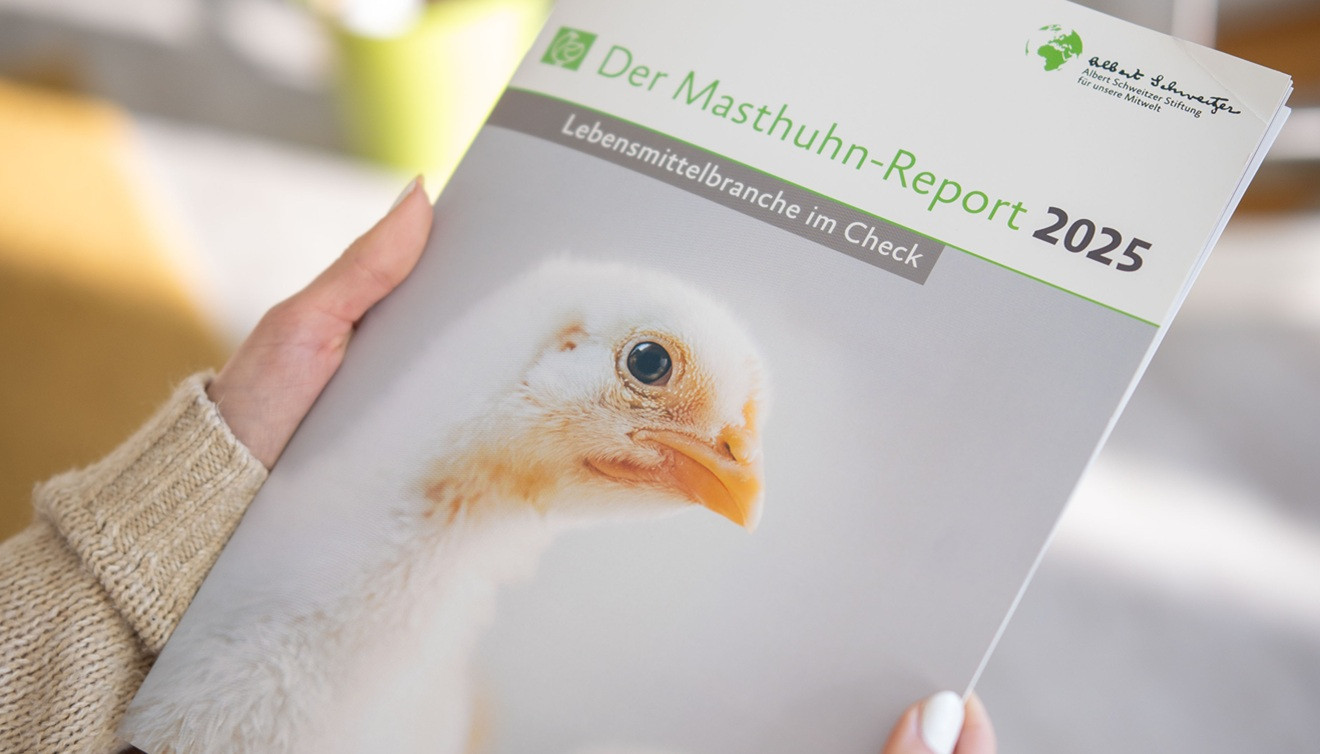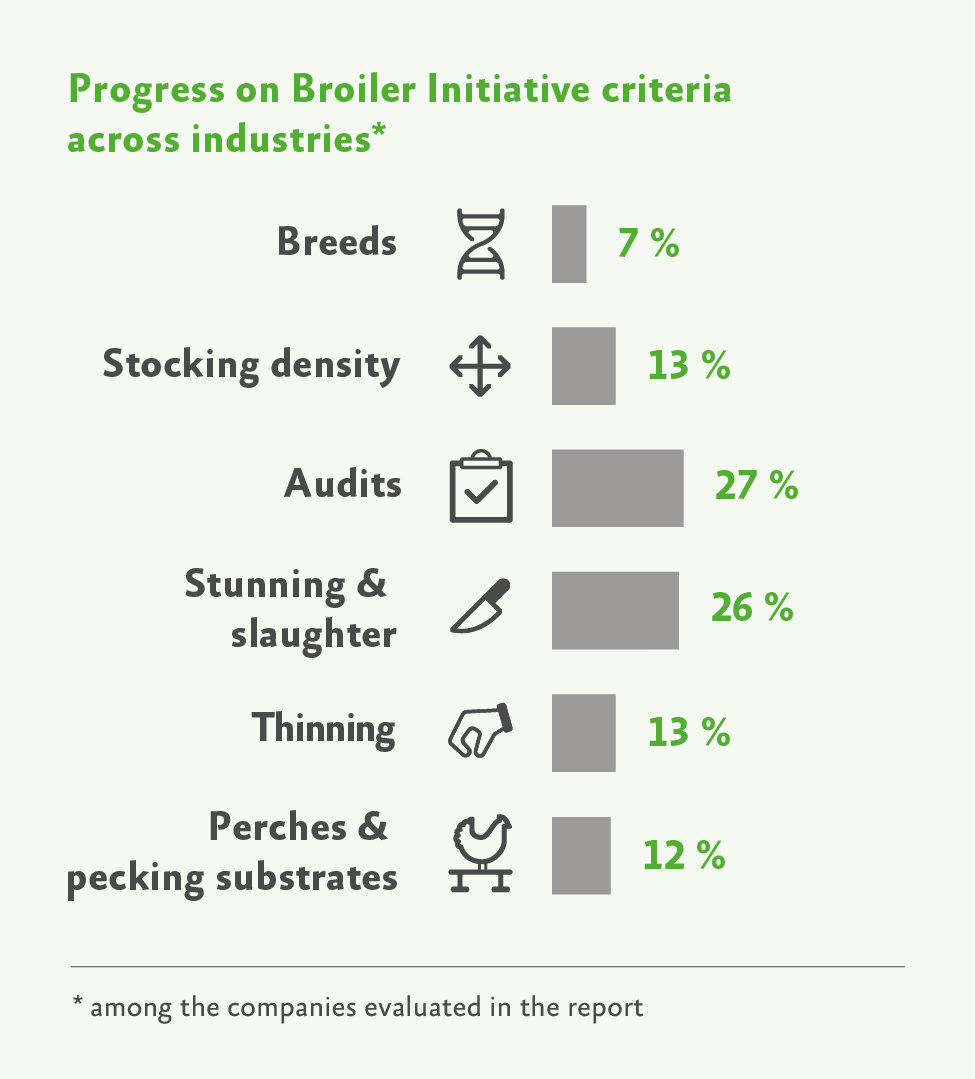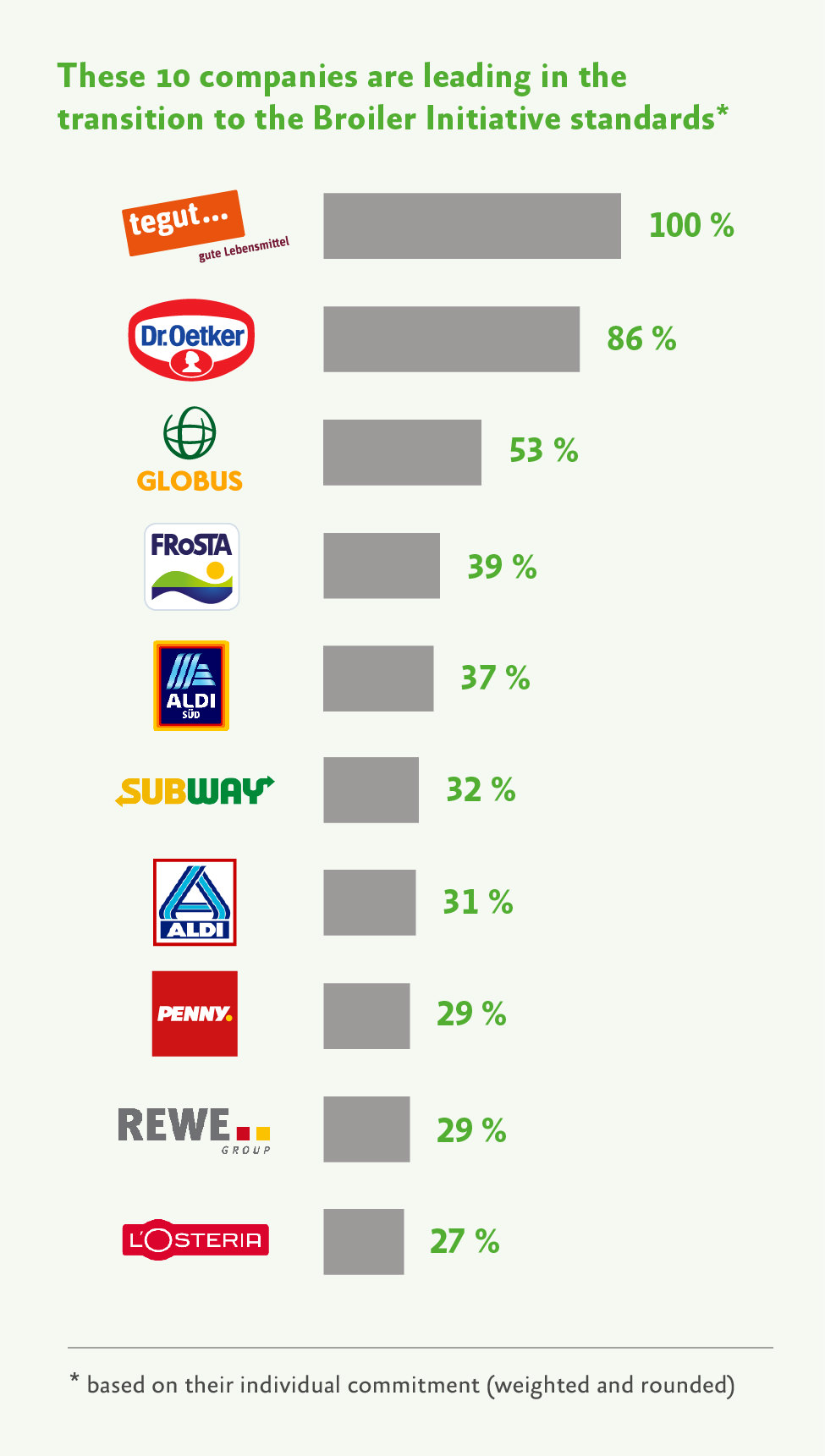
Unfortunately, some stubborn holdouts are still slowing progress – including major industry players.
Millions of chickens are raised for meat in German broiler farms, often under very poor conditions. But do companies really mean it when they promise to change things? According to the latest Pecking Order Report 2025 by the Albert Schweitzer Foundation, more than 110 companies in the food industry have committed to higher animal welfare standards for broiler chickens. At the same time, the report reveals that some industry giants continue to block any improvements. Since 2022, the Albert Schweitzer Foundation has been checking systematically whether companies in the food sector are living up to their commitments to the Broiler Initiative. The result: There are bright spots – but also persistent holdouts blocking progress.
The Broiler Initiative: An Effective Tool for Better Animal Welfare
The criteria of the Broiler Initiative are clearly defined and scientifically grounded: switching to slower-growing breeds, providing more space in the sheds, and implementing less stressful slaughtering. These standards significantly improve the animals’ living conditions and are entirely achievable. The report also highlights why transparency is crucial: companies that fail to back up their commitments with tangible progress, or to provide complete reporting, end up at the lower end of the ranking.
2026: Deadline approaching
Only those who prove their promises through deeds can remain credible when it comes to animal welfare. Next year marks the deadline for most commitments. Many companies have set 2026 as the target year to implement higher animal welfare standards. To achieve these goals, action must be more consistent and swift. 18 companies were able to improve their rating compared to 2024, while 13 others saw point deductions – partly due to stricter evaluation criteria assessing whether the commitments apply across the entire product range.

Big Names Still Dragging their Feet
Analysis of five key sectors in the food industry shows encouraging developments. Companies impress through commitments, detailed roadmaps, and transparent progress reports. Companies such as Aldi Nord and Süd, Rewe, Lidl, Penny, Globus, Hans im Glück, Tegut, Dr. Oetker, Plukon, PHW, and LDC have already adopted the criteria of the Broiler Initiative. In doing so, they demonstrate that measurable progress is achievable when animal welfare is taken seriously. It is all the more regrettable that some industry giants still show no commitment at all. McDonald’s, Burger King, Sprehe, and Rothkötter have so far refused to make binding commitments. This refusal blocks progress and demonstrates a lack of awareness of modern animal welfare standards. This is particularly striking in the food service sector, where the highest-grossing chains – McDonald’s and Burger King – are not willing to pursue higher standards across the board.

»The report also highlights why transparency is so important: companies that fail to deliver on concrete progress and transparent reporting end up at the lower end of the ranking. Only those who turn their promises into action can remain credible in terms of animal welfare.«
— Esther Erhorn, Director of Corporate Outreach, Albert Schweitzer Foundation
Consumers Have the Power
The Pecking Order Report shows that companies respond to demand and public pressure. You as consumers can take action:
-
Ask questions: Check with your preferred supermarkets, restaurants, or caterers whether they have joined the Broiler Initiative.
-
Shop consciously: Choose companies that commit to higher animal welfare standards.
-
Explore alternatives: Try plant-based options – for the sake of animal welfare and personal satisfaction. A balanced vegan diet not only prevents animal suffering but also reduces greenhouse gas emissions and natural resource consumption.
»Those who are willing can implement higher animal welfare standards – and companies benefit as well. Consumers reward transparency and commitment.«
— Esther Erhorn, Director of Corporate Outreach, Albert Schweitzer Foundation
Discounters and Supermarkets: The Power of Retail
At the top of the ranking for discount retailers are Aldi Nord and Aldi Süd. Both companies demonstrate very good reporting – categorized by criteria – and, in some areas, substantial progress. Norma remains at tier 3 with an overall score of 57%, as in 2024. It is also the only discounter to receive full marks for its commitment. Among the evaluated discounters, only the commitment from Netto ApS of the Danish Salling Group is still pending.
»The successful implementation of the Broiler Initiative requires all participants along the supply chain to work together. Together with the entire industry, Aldi Süd aims to send a clear signal and encourage policymakers to create legal and financial frameworks, supporting the transformation of animal husbandry with concrete actions.«
— Dr. Julia Adou, Director of Sustainability, Aldi Süd
Among supermarkets, Globus achieves the highest score and therefore tops the ranking. Tegut has dropped by two tiers compared with the previous year. This is due to the fact that its commitment currently only covers part of its fresh meat assortment – an aspect that was assessed more strictly this year.
»The transition to the standards of the Broiler Initiative has shown that close collaboration with our suppliers and clear communication within the company are crucial. One of our challenges is encouraging customers to understand that higher animal welfare standards come with a higher price. We rely on transparent communication, for example on our website, combined with information explaining the benefits of the improved standards.«
— Frank Peifer, Department Head / Assortment Manager 2 _TKK / Poultry-Self-Service / Fish Counter and Fish Self-Service, Globus
At the lowest level of the ranking are Bartels-Langness, Edeka, Hit, and Klaas & Kock, as well as Netto Markendiscount and Netto ApS. However, since data collection ended, the Edeka Group, including its subsidiary Netto Marken-Discount, has set new goals in line with the Broiler Initiative, which will be reflected positively in the next report.
Key Role of Food Manufacturers
Dr. Oetker and Frosta demonstrate that change is possible when there is a will to act. Top performer Dr. Oetker climbs from tier 3 to tier 2, and Frosta is also trending upward, in part because of their implementation progress. Dr. Oetker sets an example: the company not only provides detailed reporting including a roadmap but has also achieved 86% of implementation.
»We are working together with our existing suppliers to transition chicken products to Broiler Initiative standards. This has required and continues to require close collaboration with all actors along the supply chain. We are also continuously reviewing additional suitable suppliers, producers, and standards, as availability is still limited.«
— Alexander Sack, Executive Manager Sustainability, Dr. Oetker
One company continues to show no positive development at all: Eismann trails all other manufacturers by a significant margin, and so far, there is no indication of willingness to cooperate.
Contract Catering – Leaders in Commitment
Encouragingly, the top 10 largest catering companies have already committed to the Broiler Initiative. At the same time, unclear or incomplete reporting standards remain particularly noticeable. Some companies use regulatory obstacles as an excuse to delay improvements. While some announce the initial use of Broiler Initiative-compliant products, they remain tight-lipped when concrete figures are requested.
Sodexo ranks highest at tier 3, thanks to detailed reporting and a roadmap. Apetito has also improved by one tier, reaching tier 3 with 67%. With 19.5% for progress in implementation, the company performs best compared with its competitors.
»The Broiler Initiative aligns with our core values and our sustainability plan. In the early years, the initiative primarily prompted us to discuss our expectations with our suppliers. We then focused on a lever we could directly control: our purchasing system. To date, we have gradually increased the share of chicken meat meeting the criteria, so that approximately 60% of the raw materials available for order now comply with the criteria of the initiative.«
— Alexander Weiß, Head of Communications Germany, Sodexo
Genuss & Harmonie, Klüh, and L & D have published progress reports addressing, for example, the supplier situation, but they provide no concrete information on supply chain transition. This, combined with the lack of a roadmap, places these three companies at the bottom of the ranking within the closely contested catering sector.
Fast Food Restaurants Prove That Commitment Pays Off
Hans im Glück is impressive: the burger restaurant has already completed a full transition to Broiler Initiative-compliant products. L’Osteria demonstrates how points can be gained through detailed reporting and a clear roadmap, achieving an improvement of around 30 percentage points compared with the previous year. Dean & David has also climbed two tiers in the ranking.
»The biggest simplification came from centrally managed procurement. This allowed us to adjust menu development and operations smoothly without requiring our franchise partners to make complex individual decisions. For us, quality and price must go hand in hand.«
— Fabienne Schulte, Senior Sustainability Manager, L’Osteria
McDonald’s and Burger King have not committed to improving animal welfare for broiler chickens. This is regrettable, as their market power would allow them to positively influence the lives of many chickens. Call a Pizza remains a complete holdout, showing no interest whatsoever in addressing the terrible conditions in which broiler chickens are raised.
Producers as Key Drivers of Change
Plukon is the only producer at tier 2 and presents a commendable sustainability report that clearly demonstrates how the transition to higher animal welfare standards can be achieved. The producer’s transparency sets an example for the entire industry. The PHW Group (including the Wiesenhof brand and the breeding company Lohmann) is Germany’s largest poultry producer and ranks at tier 3 in our evaluation.
»Together with our farmers and retail partners, we have been able to implement and further develop extensive animal welfare criteria as required by the Broiler Initiative. We see this as a crucial foundation for a sustainable poultry industry. The steadily increasing customer demand for products from animal-friendly farming shows that our efforts are recognized and valued by consumers.«
— Rainer Dullweber, CEO, Plukon Food Group Germany
Rothkötter and Sprehe, on the other hand, show no indication of wanting to make any improvements and therefore occupy the very bottom of the ranking. This is particularly concerning, as both are among the market-dominant poultry producers in Germany.